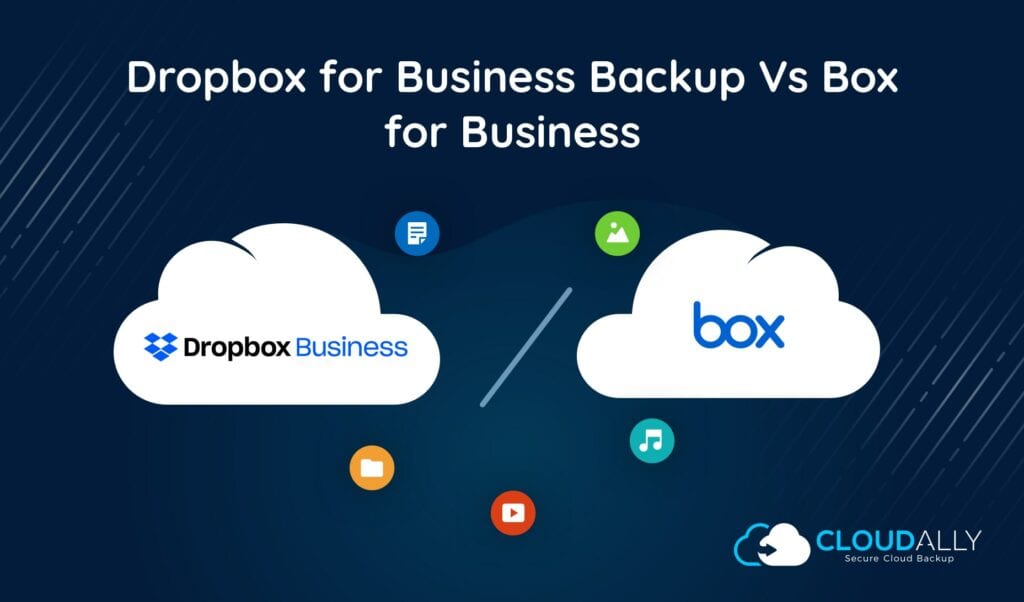The Five Most Important Things You Need to Know
Has your business already moved to the cloud for storage and related services? if so, then chances are you’re already familiar with cloud storage services such as Box and Dropbox for business backup.
There are many similar features offered by the two services, but also enough differences that it’s worth taking a closer look at both services to determine which one is the best fit for your business.
Both services started out primarily targeting individual users, but have now developed specific services catering to the business market. In this article, we’ll compare and review the business products of both companies and look add how they can add value to your business.
Comparison of Box and Dropbox for Business Backup
Security
For easy access to the cloud, both offer single sign-on facilities for users with two-factor authentication, which ensures secure login to both services.
Box offers enhanced authorization in the form of email validation, even when you log in from a new IP address. This ensures secure access to your enterprise cloud platform at all times. This email validation feature for new IP addresses is not provided by Dropbox.
The standard security technology, Secure Sockets Layer (SSL), is provided by Box and Dropbox, along with AES-256 bit encryption. Only Box is HIPAA compliant, ensuring the protection of sensitive patient data. While both offer multiple data centers, only the Box data centers are SSAE 16 Type II compliant at this time.
Another key security benefit of Box is that it allows you to password protect your key documents and folders.
Syncing and Sharing
While Dropbox offers strong support for LAN syncing, there is no such provision with Box. Dropbox also provides comprehensive support for syncing of videos and photos, both of which are lacking on Box.
Both Box and Dropbox enable you to control what your business team users can share with others (even the ones who do not have an account).
Both services also allow you to transfer ownership of a particular folder to someone else, which is especially useful when your responsibilities change or as a backup during your absence.
Collaboration and Integration
While both solutions offer good file and folder sharing options, you also need to compare their collaborative features that enable your team members to work together in real time.
Team members can comment on files while working together on shared files, and Box also allows you to collaborate with outside users as well as providing simultaneous collaboration. DDropbox lacks some of the collaborative editing abilities found in Box.
Integration with third-party applications is an important feature of any cloud services, and both solutions integrate well with standard apps such as Outlook and Office 365. At this point, Dropbox has a larger list of 3rd party app integrations than Box.
The Box API is fully customizable, which makes it easy for you to manage files, share them and collaborate efficiently.
Dropbox provides multiple APIs with specific purposes such as Dropbox Chooser (for integration with the web app), Sync API (for online and offline syncing) and Core API (to build your own app containing Dropbox features).
Backup and Data Recovery
Both services sync your files and folders across any computers and mobile devices that you have installed the app on. This feature creates a backup of sorts across multiple devices, but keep in mind that deleted items will be deleted on all synced devices so it’s still possible to loose data on both services.
Deleted items are moved to the recycle bin in both Box and Dropbox, but this is where DropBox has a distinct advantage. Box purges items from the recycle bin after 30 days by default, or by the period specified by the Admin. Dropbox on the otherhand offers unlimited file recovery of deleted items and unlimited version history for both it’s Business and Enterprise Plans.
Of course the Dropbox unlimited recovery feature is a great service, but keep in mind that items can still be hard deleted by the end user. So while this is a very useful feature, it does not eliminate the need to backup your data to protect against accidental or malicious data loss.
As file sharing services, both Box and Dropbox are prone to malware viruses such as CryptoLocker so we still strongly recommend using a 3rd party backup service such as CloudAlly to fully protect your critical business data.
Plans and Pricing
Box offers 3 business plans; Starter, Business and Enterprise as follows:
| Team Size | Storage | Box Content API | Maximum File Size | Pricing | Advanced Features | |
| Starter | Three to 10 users | 100 GB | 25K actions per month | 2 GB | $6 per user per month | Document encryption, granular permissions, user management, external collaboration, shared links, and so on. |
| Business | Minimum three users | Unlimited | 50K actions per month | 5 GB | $17 per user per month | Starter features along with Office 365 integrations, mobile security controls, custom branding, active directory, single sign-on, Box for Enterprise Mobility Management (EMM), and so on. |
| Enterprise | Minimum three users | Unlimited | 100K actions per month | 5 GB | Not Revealed; Varies as per your requirements | Business features along with workflow automation, metadata management, help desk, custom terms of service, and so on |
Dropbox offers a standard Business plan outlined below and also an Enterprise plan with deployment support, training and a dedicated account manager.
- Minimum five users
- Pricing at $15 per user per month
- Unlimited file recovery and third-party integrations
- As much space as required by starting off with 1 TB
- Microsoft Office 365 integration
- User controls and permissions
- Email and phone support
- Password protected links
- Free 30-day trial
We hope this article has helped to clarify some of the primary differences between the two services.


